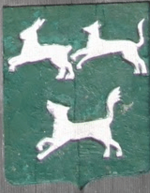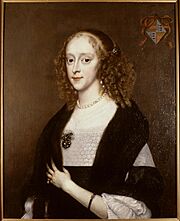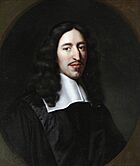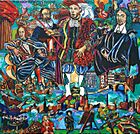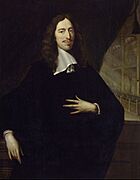Johan de Witt facts for kids
Quick facts for kids
Johan de Witt
|
|
|---|---|
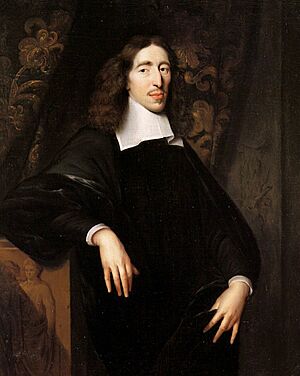 |
|
| Grand Pensionary of Holland | |
| In office 30 July 1653 – 4 August 1672 |
|
| Preceded by | Adriaan Pauw |
| Succeeded by | Gaspar Fagel |
| Pensionary of Dordrecht | |
| In office 21 December 1650 – 30 July 1653 |
|
| Preceded by | Nicolaas Ruys |
| Succeeded by | Govert van Slingelandt |
| Personal details | |
| Born | 24 September 1625 Dordrecht, Dutch Republic |
| Died | 20 August 1672 (aged 46) The Hague, Dutch Republic |
| Political party | States' Party |
| Spouse |
Wendela Bicker
(m. 1656) |
| Children | Johan de Witt Jr. |
| Parent |
|
| Relatives |
|
| Alma mater | University of Leiden |
| Signature | |
Johan de Witt (born September 24, 1625 – died August 20, 1672) was a very important Dutch statesman. He lived during the Dutch Golden Age, a time when the Dutch Republic was a powerful trading nation.
Johan de Witt became the Grand Pensionary of Holland. This was like being the chief minister of the most important province. From about 1650 until 1672, he and his uncle, Cornelis de Graeff, largely controlled the Dutch government. Their strong teamwork, especially with support from Amsterdam, helped organize the country's political system.
De Witt was a strong supporter of the Republic, meaning he believed the country should be run by elected officials, not a king or a prince. He was against the House of Orange-Nassau, who wanted more power. He thought power should stay with local leaders, called regenten.
However, De Witt focused mostly on the navy and didn't pay enough attention to the army. This proved to be a big problem in 1672, known as the Rampjaar (Disaster Year). In that year, the Dutch Republic was attacked by England, France, and some German states. The country suffered many quick defeats. People became very angry and blamed Johan de Witt and his brother Cornelis de Witt. Sadly, they were killed by an angry mob in The Hague.
Contents
His Family and Early Life
Johan de Witt came from the old and respected De Witt family in the Netherlands. His father, Jacob de Witt, was a powerful leader in the city of Dordrecht. In the 1600s, Dordrecht was one of the most important cities in the province of Holland.
Johan's mother was Anna van den Corput. He had an older brother named Cornelis de Witt, who also had an important career. Johan's uncle, Andries de Witt, was also a Grand Pensionary of Holland for a short time.
Johan and Cornelis grew up with many advantages. Their father knew many important scholars and scientists. Both brothers went to the Latin school in Dordrecht. There, they learned about the values of the ancient Roman Republic. After Latin school, Johan de Witt studied at Leiden University. He was very good at mathematics and law. He earned his doctorate degree in 1645. Later, he worked as a lawyer in The Hague.
Marriage and Children
In 1655, Johan de Witt married Wendela Bicker. She was the daughter of Jan Bicker, a very powerful leader in Amsterdam. Through this marriage, De Witt became related to many other important families in Amsterdam. These families included the Bickers, De Graeffs, and Hoofts.
His brothers-in-law were also important allies. They included Pieter de Graeff, a high official, and Jean Deutz, a banker. These connections helped De Witt in his political career.
Johan and Wendela had four children: three daughters and one son:
- Anna de Witt (1655–1725)
- Agnes de Witt (1658–1688)
- Maria de Witt (1660–1689)
- Johan de Witt Jr. (1662–1701), who later became a city secretary.
After Johan de Witt's death, his brother-in-law, Pieter de Graeff, took care of his children.
Becoming a Leader
In 1650, the year the Dutch leader William II, Prince of Orange died, Johan de Witt became a representative for Dordrecht. In December 1650, he became the pensionary of Dordrecht. He held this job until July 1653.
Elected Grand Pensionary
In July 1653, the States of Holland elected De Witt as their Grand Pensionary. This was a very important position. Holland was the most powerful province in the Dutch Republic. This meant De Witt became the main political leader of the entire country.
The Grand Pensionary of Holland was often called the "Grand Pensionary" by people from other countries. This was because Holland was the strongest province in the Dutch Union. De Witt used his experience and knowledge to lead the States of Holland. He was not like a modern Prime Minister, but he was the most influential person in the government.
De Witt represented the interests of Holland's shipping and trading businesses. These businesses were very important for the country's economy.
His Political Goals
As a leader of the "States Party," Johan de Witt worked for the interests of Dutch merchants and wealthy families. His main goals were:
- Peaceful Foreign Policy: He believed that wars were bad for the economy. He wanted the Netherlands to have peaceful relationships with other countries.
- Strong Holland: He wanted Holland to have as much independence as possible from the other six provinces. He thought the other provinces were a burden on rich Holland.
- No Prince of Orange: He wanted to keep the Princes of Orange from gaining too much power. He believed their royal ambitions went against the interests of the merchants.
Working with Cornelis de Graeff
During the Dutch Golden Age, from 1650 to 1672, political power in Holland was mainly held by two groups of brothers. In Amsterdam, it was the brothers Cornelis de Graeff and Andries de Graeff. In The Hague, it was Johan and Cornelis de Witt. They worked very closely together and were also related.
Johan de Witt relied on the political help of Dutch cities, especially Amsterdam. He understood how powerful his uncle, Cornelis de Graeff, was as a mayor. De Witt always tried to meet Amsterdam's wishes. He needed De Graeff's advice and support. De Graeff was known for his clear thinking and honesty.
Their relationship was a mix of close family ties and deep respect. De Graeff was a political equal to De Witt. De Witt's letters show how much he trusted his uncle in both political and family matters.
Leading Statesman
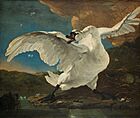
De Witt's power came from the wealthy merchant and noble class he was born into. This group believed in religious moderation and a practical foreign policy that protected trade. The "Orange faction," however, wanted a strong leader from the House of Orange-Nassau. They saw this leader as a balance against the rich upper classes.
When Johan de Witt became the leader of the Dutch Republic in 1653, the country was fighting England in the First Anglo-Dutch War. The English navy was blocking Dutch ports, causing a serious economic crisis. De Witt's main goal was to make peace quickly.
England's leader, Oliver Cromwell, demanded that the Princes of Orange should never again hold power in the Netherlands. Cromwell did this because the Princes of Orange supported his enemies, the Stuart royal family. De Witt knew the other Dutch provinces would not agree to this easily.
But De Witt and his uncle Cornelis de Graeff worked together very well. This teamwork was key to De Witt's success and helped the economy recover after the war. In May 1654, they made peace with England through the Treaty of Westminster.
After the war, the Netherlands became richer and more powerful under De Witt's leadership. He always focused on helping his country's trade. In 1658 and 1659, he sent many ships to the Baltic Sea. This was to help Denmark against Sweden and to make sure Dutch merchant ships could pass freely. De Witt also built a strong navy.
Despite all his political successes, De Witt always acted like a humble public servant. He walked the streets of The Hague without guards, with only one servant. An English ambassador said he looked "indistinguishable from the common man." He always said he had "no decisive vote, authority or power." But the French ambassador reported that real power in the Netherlands rested with "Monsieur de Witt."
In 1660, De Witt and other leaders decided to oversee the education of the young William III of Orange. De Witt wanted to prevent any member of the House of Orange from gaining power. He convinced many provinces to get rid of the stadtholder position completely. He supported his ideas by promoting the theory of republicanism. He even helped write a book called Interest of Holland in 1662, which supported republican ideas. Because of this, many supporters of the House of Orange, especially common people, disliked him.
War with England, Conflict with France
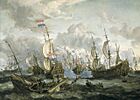
After Oliver Cromwell died in 1658, the monarchy returned to England in 1660 with Charles II. This made relations between England and the Netherlands worse. Five years later, the Second Anglo-Dutch War (1665–1667) began.
De Witt improved the Dutch navy by building bigger and stronger warships, like the English ones. After an early defeat, he even took command of the fleet himself for a short time. To help with his seasickness, the famous scientist Christiaan Huygens invented a special hammock for him. In late 1665, Michiel de Ruyter took over command of the fleet at De Witt's suggestion.
More fighting in 1666, along with the Great Plague and the Great Fire, caused problems for England. By 1667, England could not afford to send out a new fleet. De Witt took advantage of this. He sent the Dutch fleet up the Medway river, led by his brother Cornelis de Witt. At Chatham, the Dutch destroyed most of the English warships. The sound of the cannons could be heard in London, causing panic. England was then ready for peace talks, and De Witt was involved. Peace was made in 1667 with the Peace of Breda.

In 1667, De Witt, with support from others, issued the Perpetual Edict. This law officially ended the position of stadtholder and said that the stadtholder could not also be the army commander. This was a final step to remove the House of Orange from power.
However, the Dutch army was not kept strong enough. This was risky because France, led by King Louis XIV, was expanding its power. France also saw the Dutch Republic as a strong economic rival. Johan de Witt tried to keep the Republic safe by having a friendly policy with France. But he did not want to agree to Louis XIV's plan to divide the Spanish Netherlands. De Witt preferred a Spanish-controlled area on the southern border of the Republic. This would act as a buffer zone, keeping a powerful France further away.
On January 23, 1668, the Triple Alliance was formed with England and Sweden. The three countries agreed to help each other if France attacked one of them. De Witt still did not want to break ties with Louis XIV. So, they agreed to ask Spain to give some cities in the Spanish Netherlands to France. Only if Louis XIV refused and continued the war would the three countries use military force against France. This last part was kept secret at De Witt's request, as he didn't want to upset the French. What De Witt didn't know was that Charles II of England had only joined the treaty to break Dutch-French ties. A month later, Charles II told Louis XIV about the secret part. Louis XIV then secretly agreed with England to attack the Dutch Republic together.
Death
The year 1672 is called the disaster year in the Netherlands. France and England attacked the Republic in the Franco-Dutch War. On June 21, Johan de Witt was badly hurt by an attacker. He resigned as Grand Pensionary on August 4. But this was not enough for his enemies.
His brother Cornelis, who was very disliked by the Orange supporters, was arrested. He was accused of treason, but the charges were false. He was tortured, which was common at the time to get a confession. But Cornelis refused to confess. Still, he was sentenced to exile. When Johan went to the jail to help his brother start his journey, both brothers were attacked by an angry mob. They were shot and then left to the crowd.
Mathematics
Johan de Witt was also a talented mathematician. He described how to draw hyperbolas and parabolas using moving lines and angles. In 1661, his work was published in a book about analytic geometry. This book is considered one of the first textbooks on the subject.
De Witt also contributed to financial mathematics. He wrote about "The Worth of Life Annuities Compared to Redemption Bonds." This work combined his roles as a statesman and a mathematician. A life annuity was a way for people to get a regular income from the state until they died, in exchange for a one-time payment. De Witt showed that a bond paying 4% interest would give the same profit as a life annuity of 6%. But at the time, the government was paying over 7% on annuities. His work on life annuities is one of the first times probability was used in economics.
See also
 In Spanish: Johan de Witt para niños
In Spanish: Johan de Witt para niños
 | Tommie Smith |
 | Simone Manuel |
 | Shani Davis |
 | Simone Biles |
 | Alice Coachman |


